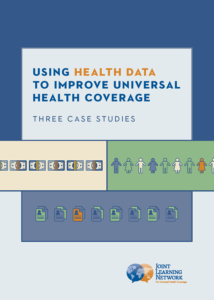Using Health Data to Support UHC: New Case Studies
Governments are increasingly turning to data to help guide them in the development and strengthening of Universal Health Coverage. Health data has the potential to influence policies and programs that can increase the accessibility and quality of services, enable better financial management, and identify new efficiencies within the health system. Despite great advancement in this area, many countries still face complicated, foundational challenges with harnessing the value of their health data.
Over the course of 2017, the Data Foundations Collaborative came together to share their experience and expertise in using health care data. Practitioners from ten countries (Ghana, India, Indonesia, Kenya, Malaysia, Nigeria, Peru, the Philippines, South Korea, and Sudan) collaboratively prepared examples of data use best practices and the entrenched challenges that countries still face. A new publication, Using Health Data to Improve Universal Health Coverage: Three Case Studies, presents the lessons and findings from these conversations in order to capture the knowledge shared between countries.
Through the lens of South Korea’s experience, the case studies present an inspirational example of data use, as well as how other countries are moving towards more effective use of data. Framed around three topic areas, the case studies take an in-depth look at how data are used for chronic disease management and financial management, as well as the use of insurance claims data.
- Chronic Disease Management
The first case study examines how national health programs have used data to identify populations at risk of chronic disease, shape new care models, reduce care variation, and improve outcomes using evidence-based treatment. Data allow countries to have a more comprehensive view of chronic disease over time, plan for future demands on the health system, and engage populations in prevention programs to decrease individual risk. - Financial Management
The second case study examines how data are used in financial management of health programs. It provides examples of different financial structures and how countries apply data to budgeting, real-time financial management, and risk analysis. Countries have a wide variety of financial systems supporting health care, so understanding different ways data can be leveraged provides new ideas for creating stability and sustainability for UHC programs. - Claims Data Utilization
The final case study examines ways to use claims data to improve operational efficiency and service delivery and understand the cost of those services. Claims data can be a rich source of health information if stakeholders are able to access, visualize, and translate this data into useable information. In addition, claims data can help detect improper spending, identify new areas of efficiency, detect fraud within the health system, and monitor overall quality of health services.
As health systems continue to introduce digital tools to collect and analyze data, more focus will be placed on making timely and effective use of this data. As expectations grow, countries will be looking for examples and best practices for using health data. Countries have specific contexts that require unique approaches, but many of the challenges they face are common across contexts. These challenges require transformative thinking and solutions that address the fragmentation of health information.
Following the development of these case studies, the Data Foundations Collaborative began developing a companion guide that will help countries adapt and adopt the recommendations and findings found in the case study. Our hope is that countries will be able to use the assessment guide and case studies to begin conversations on data use and help move them forward to mature, connected health information systems.
The case studies are available to download on the JLN website, and the companion guide will be available in early 2019.

